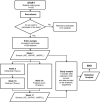Empathy Enhancement Based on a Semiotics Training Program: A Longitudinal Study in Peruvian Medical Students
- PMID: 33192851
- PMCID: PMC7658416
- DOI: 10.3389/fpsyg.2020.567663
Empathy Enhancement Based on a Semiotics Training Program: A Longitudinal Study in Peruvian Medical Students
Abstract
Background: Empathy, as a core element of medical professionalism, is part of leadership in medicine. This attribute, predominantly cognitive, involves understanding and communication capacity. Empathy can be enhanced with courses on medical semiotics. It appears adequate to apply this enhancement in the early stages of professional training. Based on this, this study was performed with the purpose of demonstrating the positive effect that an academic course on medical semiotics has on the development of empathy in medical students.
Methods: A quasi-experimental study was conducted in one School of Medicine in Peru, where medical students had to attend a 17-week course on medical semiotics as part of their regular training. The sample, composed by 269 students, included two cohorts of third-year medical students. As main measures, the Jefferson Scales of Empathy (JSE), inter-professional collaboration (JSAPNC), and lifelong learning (JeffSPLL), were used. In addition, students' scores evaluating theoretical and practical aspects of the course were collected once the course was finished. Pre- and post-tests were administered in week 1 and in week 17. Analyses compared measures in both moments and in time. Inter-professional collaboration and lifelong learning scores and empathy scores were used as discriminant and convergent validity measures of students' course scores, respectively.
Results: Gender differences on empathy appeared, but only at the beginning. In the entire sample, empathy enhancement was confirmed in time (p < 0.001), with a large effect size (r = 0.45). This effect was also observed in both gender groups, separately. On the contrary, no changes appeared in inter-professional collaboration and in lifelong learning abilities in time. In addition, a positive correlation was observed among empathy, inter-professional collaboration and lifelong learning abilities at the beginning and at the end, confirming that the improvement observed was specific for empathy and explained by the educational intervention assessed.
Conclusion: These findings bring empiric evidence supporting the positive effect that training in medical semiotics has on empathy. In addition, these findings highlight some gender differences in the development of empathy in medical students.
Keywords: empathy; lifelong learning; medical curriculum; medical semiotics; medicine students; professionalism; teamwork ability.
Copyright © 2020 Fernández-Rodríguez, Bardales-Zuta, San-Martín, Delgado Bolton and Vivanco.
Figures


References
-
- Alcorta-Garza A., González-Guerrero J. F., Tavitas-Herrera S. E., Rodríguez-Lara F. J., Hojat M. (2005). Validación de la escala de empatía médica de Jefferson en estudiantes de medicina mexicanos. Salud Ment. 28 57–63.
-
- Berduzco-Torres N., Choquenaira-Callañaupa B., Medina P., Chihuantito-Abal L. A., Caballero S., Gallegos E., et al. (2020a). Factors related to the differential development of inter-professional collaboration abilities in medicine and nursing students. Front. Psychol. 11:432. 10.3389/fpsyg.2020.00432 - DOI - PMC - PubMed
-
- Berduzco-Torres N., Medina P., Choquenaira-Callañaupa B., San-Martín M., Delgado Bolton R. C., Vivanco L. (2020b). Family loneliness: its effects in the development of empathy, teamwork and lifelong learning abilities in medical students. Front. Psychol. 11:2046. 10.3389/fpsyg.2020.02046 - DOI - PMC - PubMed
LinkOut - more resources
Full Text Sources
Research Materials

